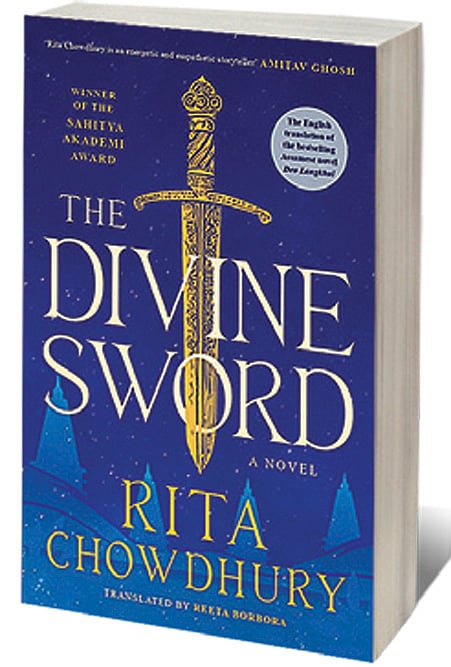Revenge and Redemption

THE DIVINE SWORD is the translation of the Sahitya Akademi award-winning Assamese novel Deo Langkhui, an epic of incredible beauty and subtle nuances. Chandraprabha, the beautiful young queen of Mayapur, is wrongly accused of infidelity and banished by her husband King Pratapchandra. She is pregnant, but is accepted by Sadhukumar, king of Gobha, who swears to make her son king and never become a father. Since the queen of Mayapur announces that the Brahmaputra has swallowed her daughter-in-law, Chandraprabha changes her name to Konsari and begins a new life in Gobha. She adopts the local dress and traditions to integrate into their society. Soon, her son Mriganko is born in Gobha and adopted by Sadhukumar. One day, the 10-year-old Mriganko leaves home to join the samadi, a sort of boys’ hostel where he spends the next 12 years learning skills, from handling weaponry to constructing houses and crafts. Assamese tribal traditions dot the story.
Mriganko returns home and meets Gangavati, queen of Khola. But the marriage is forbidden because they are both from the same clan, although Mriganko does not know his birth father. But the pregnant Gangavati does not turn up to run away with him, for they will be banished by society. In anger, Mriganko agrees to marry Ratnavali, daughter of the scheming Nilakanta. But Ratnavali is in love with the neighbouring King Fingua Kunwar. She is forced to go through the marriage and even produces two sons. But her love for Kunwar never ends. This will have a terrible impact, resulting in death and destruction and impacting the future of so many lives and kingdoms.
AIming High
20 Feb 2026 - Vol 04 | Issue 59
India joins the Artificial Intelligence revolution with gusto
One day, Mriganko unknowingly murders his biological father Pratapchandra. Horrified to learn the truth, Mriganko becomes an ascetic, only to be murdered by Jokanko, his son through Gangavati, of whose existence Mriganko was unaware. Jokanko is now known as Jongal Bolohu, and becomes king of Mayapur and beyond. Jokanko marries the beautiful Sukomola and acquires the divine sword. Greed for power and the sword destroys kings and kingdoms, friendships, marriages, and loyalties. Chandraprabha or Konsari and Sadhukumar silently observe tragedies happening one after another, unable to stop the rapid march of events.
The descriptions of Assamese life, the countryside and small details are stunning. The descriptions of Konsari’s “lavish yellow silk mekala”, “beautifully embroidered riha” and “deep red cotton chador, dyed with lac and boiled water, adorned with blue flowers”, and her silver jewellery are brought alive by the author’s language. Interestingly, the popular form of travel for kings is by elephant, for horses are a rarity and it is only the uncommon emperor who can own a horse.
Needless to say, the story is full of twists and turns and wheels within wheels. Fathers do not hesitate to use their daughters to further their own interests, even spy for them. Naturally, this invariably ends in tragedies. There are shades of the Mahabharata, as when Sadhukumar decides—like Bhishma—to never father a child or Mriganko kills his father and Jokanko kills his brother—neither of them knowing the relationships.
Neither the pregnant Chandraprapha nor the pregnant Gangavati choose to tell the fathers of their children about their forthcoming babies. This invariably results in more tragedy.
Rita Chowdhury writes with empathy and energy, feeling the anguish of the victims. This epic is well-deserving of the Sahitya Akademi Award. The translator Reeta Borbora has also created a visually moving story in English.
The only missing adjuncts are a glossary to explain untranslated Assamese words and a map, which would make it easier to follow the movement around Assam, as kingdoms crash and dynasties disappear in this tale of love and sacrifice. Interestingly, the author uses politically inappropriate caste terms like Aryan-Kshatriya and tribal names nonchalantly. But I remember being equally surprised when I visited Assam and people casually introduced themselves and each other as Aryans, Kshatriyas, Brahmins or tribals. This book belongs to an un-self-conscious age, and people who are not politically correct.

